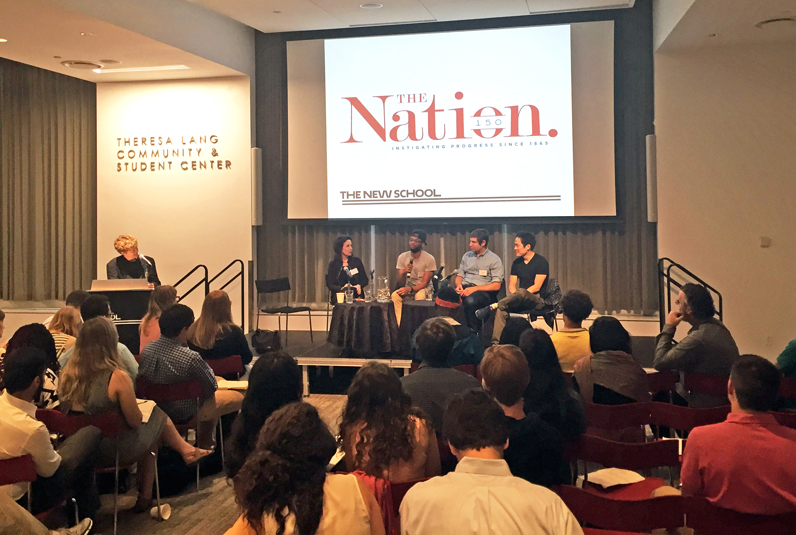
Instigating Progress: Students Learn to Cover Social Movements from The Nation
Since it emerged in 2013, Black Lives Matter has been treated by the mainstream news media in ways that, for Nation writer Mychal Denzel Smith, totally miss the point.
Sometimes it’s portrayed as a sprawling, agenda-less social movement driven by police violence against black people; at other times, it’s characterized as a far-left militant group that threatens law and order.
Missing from these sensationalist and/or lazy narratives, Smith said, is a nuanced—or, put another way, accurate—representation of what Black Lives Matter is really all about.
In truth, it is a full-fledged civil rights organization with more than 30 chapters across the United States and a clearly defined platform encompassing a range of issues—yes, police brutality, but also racial inequality, criminal justice reform, economic justice, and more. Its actions are, by and large, peaceful.
Smith noted that it’s his job—and the job of the 60 student journalists gathered at the Theresa Lang Community Center earlier this month—to paint a clearer and fuller picture of Black Lives Matter and other social movements, whether Occupy Wall Street, the gay rights movement, or even the Tea Party and backers of Donald Trump.
“When covering the golden era of Black politics, including the civil rights movement, the news media created a narrative that sanitized and depoliticized the era, defanging the radical notion of reshaping American democracy that that movement fought for,” Smith said. “The point is to ensure we don’t allow the same thing to happen to Black Lives Matter.”
Smith made his remarks at the 2016 Nation Student Journalism Conference, a day-long event hosted by the leading progressive weekly magazine and The New School where student journalists learned about social movements, their historic and contemporary impact on electoral politics, and how journalists can better cover them. The conference featured workshops, panels, breakout sessions, and a screening of the film Hot Type: 150 Years of The Nation.
The conference brought together students from across the country—and across a range of disciplines—including a number of students from The New School. They included Matthew Amaral, International Affairs ’16; Aubrey Bloomfield, International Affairs ’16; Rachael Bongiorno, Media Studies ’16; Ella Colley, International Affairs ’16; Gonzalo del Peon, Strategic Design and Management ’16; Shadi Garman, International Affairs ’16; Alex Gerald, Journalism + Design ’16; Melissa Guerrero, Journalism + Design ’16; Shona Kambarami, International Affairs ’16; and Odalis Garcia, Journalism + Design ’16.
“The conference was excellent,” Kambarami says. “There was a wonderful balance between panel discussions and interactivity with students, whether socially or in the form of student-led discussions and questions. Most important, a network of student journalists across the country was created, which can only be more valuable to us in our careers, but also to journalism and professional media writing.”
The New School, an academic institution where faculty and students work to address problems afflicting 21st-century societies, was the “ideal setting” for the conference, Schools of Public Engagement dean Mary Watson said.
“The Nation and The New School both embody the values of free speech, free inquiry, and a dedication to tackling some of the most pressing issues of our time,” Watson said. “This conference gave journalism students from across the country, including those at The New School, the opportunity to learn about the rigorous reporting and contextualized political analysis for which The Nation is known. It is through this approach that students can challenge the conventional accounts of the social movements shaping our world.”
Those conventional accounts were questioned in “How Movements Have Shaped Election 2016 and How to Report on Them,” a morning panel moderated by broadcast journalist Laura Flanders, featuring Smith, Nation editors Katrina vanden Heuvel and Richard Kim, and reporter Ari Berman. While Smith detailed his coverage of Black Lives Matter, Berman discussed his reporting on the resistance to new Republican-led voting restrictions that have disenfranchised thousands of young, elderly, and minority voters across the country.
Berman argued that too many media outlets are “treating this as a fringe issue. But it’s one of the most important issues of our time, one that shapes people’s fundamental rights in a democracy.”
Kim, meanwhile, touched on the media’s failure to predict the rise of Donald Trump and appreciate the grievances fueling his voters. Many reporters, Kim said, “didn’t have the right reporting apparatus to report on this phenomenon,” relying on the perspective of the Republican political elite instead of Trump’s grassroots supporters.
“You’d be lying if you thought that a billionaire reality TV star real estate mogul who donated money to Hillary Clinton would be the Republican presidential nominee,” Kim said. “There was a complete failure to appreciate the grassroots right-wing revolt that has captured the GOP.”
Like The New School, The Nation has in the course of its 151-year history challenged assumptions, uncovered the truth, and tackled pressing social issues.
“We try to be systemic, radical—to go to the root of an issue, to never accept the status quo, to never let our coverage be defined by who is powerful,” vanden Heuvel said.
It is a message that resonated with the 60 journalism students, who aspire to use their practice for social good—to do justice to the major social movements shaping 21st-century politics.
“It was genuinely inspiring to be able to talk to the people who are making such a radical and crucial publication thrive in today’s often discouraging media landscape,” del Peon says. “Aside from the panels and workshops being phenomenal in and of themselves, being able to hear from that group of amazing journalists was a really valuable experience, especially for a journalism student who is unsure what the future of journalism will look like.”